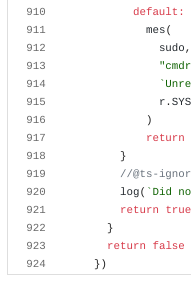this post was submitted on 21 Nov 2023
96 points (95.3% liked)
Programming Horror
2070 readers
1 users here now
Welcome to Programming Horror!
This is a place to share strange or terrible code you come across.
For more general memes about programming there's also Programmer Humor.
Looking for mods. If youre interested in moderating the community feel free to dm @[email protected]
Rules
- Keep content in english
- No advertisements (this includes both code in advertisements and advertisement in posts)
- No generated code (a person has to have made it)
Credits
founded 2 years ago
MODERATORS
you are viewing a single comment's thread
view the rest of the comments
view the rest of the comments

Any guide on how to write effective logs? I'm starting to write scripts to automate some processes at my job and want to start logging the process to debugging or troubleshooting in the future.
The most useful thing you can do for simple scripts is never use the same log string in two locations in your code. If you reuse strings it can become very confusing where a specific log line printed from. In addition, write logs that let you trace the execution of the program, down to some kind of identifier that allows you to determine (for example) the exact iteration of a loop that caused an error.
I'd use logger that prints the file and line number when logging, to avoid the question of: "where is the log coming from"
For one thing: don't bother with fancy log destinations. Just log to
stderrand let your daemon manager take care of directing that where it needs to go. (systemd made life a lot easier in the Linux world).Structured logging is overrated since it means you can't just do the above.
Per-module (filterable) logging are quite useful, but must be automatic (use
__FILE__or__name__whatever your language supports) or you will never actually do it. All semi-reasonable languages support some form of either macros-which-capture-the-current-module-and-location or peek-at-the-caller-module-name-and-location.One subtle part of logging: never conditionally defer a computation that can fail. Many logging APIs ultimately support something like:
This is potentially dangerous - if logging of that level is disabled, the code is never tested, and trying to enable logging later might introduce an error when evaluating the arguments or formatting them into the message. Also, if logging of that level is disabled, side-effects might not happen.
To avoid this, do one of:
if-style deferring, internally or externally. Instead, squelch the I/O only. This can have a significant performance cost (especially at theDEBUGlevel), which is why the API is made in the first place.